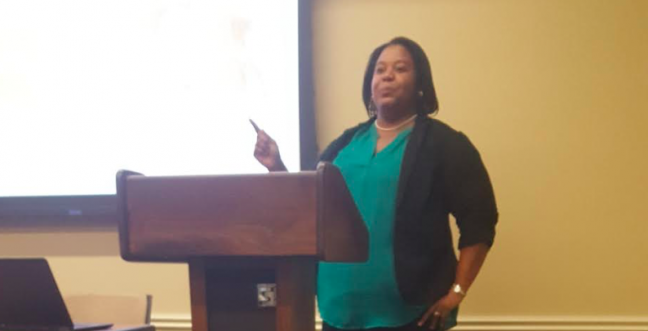University of Wisconsin African American Studies professor Christy Clark-Pujara gave a lecture Tuesday hosted by the Wisconsin Union Directorate Society and Politics committee addressing the experiences of African Americans in Wisconsin during the 18th and 19th centuries.
Clark-Pujara’s lecture focused on how black people were perceived by white Wisconsinites during the territorial and early statehood phases of Wisconsin’s history and the damaging effect of associating black people with slavery.
“Blackness and slavery are conflated,” Clark-Pujara said. “They are the same in the minds of white people.”
Clark-Pujara said black liberty and black citizenship were continually denied in the state of Wisconsin through increasingly “absurd measures.” She also said Wisconsin barred discussion of black citizenship and suffrage until 1866, while Wisconsin became a state 18 years earlier.
Clark-Pujara also mentioned the creation of Wisconsin’s original constitution in 1846, which included black suffrage as a provision. The constitution did not pass because this provision was deemed too radical at the time, even though a majority of the delegates did not vote to kill it.
Instead, a large percentage of voting delegates abstained altogether, and another version without the black suffrage provision was written and passed.
“Whiteness was the standard [for suffrage],” Clark-Pujara said. “Not even citizenship.”
Clark-Pujara spoke about several key figures in Wisconsin history as well. She told the story of Ezekiel Gillespie, a black man based in Milwaukee who became a key figure in the black suffrage movement, suing the state for the right to vote. She also talked about Joshua Glover, a fugitive slave who was jailed in Racine before he was broken out by a group of abolitionists.
Clark-Pujara also spoke about former Wisconsin Gov. Howard Dodge, owner of several illegal slaves during his gubernatorial service. She made a point of saying the names of his slaves and spoke out against several key Wisconsin landmarks named after him, notably the town of Dodgeville.
“Toby, Tom, Leer, Jim and Joe,” Clark-Pujara said. “I say their names a lot because Dodge’s name has been peppered all over the state, but few people know his wealth was in Toby, Tom, Leer, Jim and Joe.”
Wisconsin whites were not abolitionists, though many of them opposed slavery, Clark-Pujara said.
She also pointed out a period after the slaves had been emancipated when 19th century Republicans attached black suffrage to their campaign platform. But it did not garner enough votes so they dropped it.
Clark-Pujara said that while granting black people suffrage would not do much to stand in the way of white Wisconsinites voting due to their small percentage of the population, early white Wisconsinites refused to do it based on ideology.
These Wisconsinites still associated black skin with slavery, and according to Clark-Pujara, these attitudes still prove harmful today.
“The history of suffrage in Wisconsin has been a history of racism and sexism,” Clark-Pujara said. “We need to understand the regulations of voting within a historical context, these aren’t new debates, these aren’t new arguments.”


